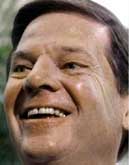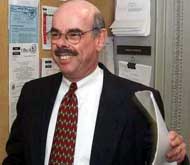
David Corn
http://www.jewishworldreview.com --
Recently my family headed to a paint store to gather supplies. When I
wheeled the little one into the shop, we were met by fumes. Fearing the
bearer of my DNA would suffer untold harm should she inhale any of these
chemicals, I rushed her outside. The missus continued on with the
mission. When she reached the counter, she asked the sales clerk how he
could withstand this airborne assault on a daily basis. “Smell, what
smell?” he replied. “Guess I don’t smell it anymore.”
A similar acclimation—call it a benumbing—has occurred throughout
Washington. In recent weeks, there’s been an avalanche of evidence that
the nation’s capital reeks of institutional corruption. Granted, that’s
no news flash. Almost daily, the campus paper, The Washington Post,
exposes a money-and-politics outrage. Yet there is little anger, and,
consequently, little change. Last month, Senate Republicans, using
parliamentary procedures, blocked passage of the most lightweight of
reform measures, a bill advanced by Senators John McCain and Russ
Feingold to abolish soft money—the mega-contributions from corporations,
unions and millionaires that both parties use without shame to
circumvent restraints on political fundraising.
Even had this legislation passed, it would not have redressed most of
the ills. High-priced K St. lobbying that skews the legislative process,
pay-to-play campaign contributions, pork-barrel projects that rob
taxpayers of their hard-earned dollars—this corruption is routine. Its
exposure causes little discomfort for the culprits. In explaining why
business interests this year are giving equally to the House Democratic
and Republican campaign arms (after heavily favoring the GOP in recent
years), Rep. Patrick Kennedy, who heads the Democratic Congressional
Campaign Committee, told the Post that business donors, realizing the
Democrats may win back the House, are hedging their bets: “Major
corporate donors want to be able to enjoy the same access as they do
with the current majority... For them, it’s a business proposition.”
They are buying access—and the Democrats and Republicans are eagerly
selling it. To put it mildly, members of Congress deciding with whom
they’ll discuss legislative matters based on campaign contributions does
not seem to be in the public interest. Yet Kennedy is not bashful in
acknowledging this blatant access-peddling.
In another ho-hum-inducing story, the Post noted that Kennedy and the
House Democrats had assiduously courted Steve Wynn, the Las Vegas
gambling king. Wynn was angry at the Republicans for failing to smother
an antigambling initiative in Congress. After four years of
sweet-talking—Rep. Charles Rangel was chief Romeo for the Democrats—Wynn
offered to donate up to $1.5 million in soft money to the Democrats’
project to regain the House. How do you think that might affect
Democratic leader Dick Gephardt’s view on casino-related legislation?
 |
| Delay |
DeLay has enlisted a bevy of corporate lobbyists as key members of his money machine. This is how he operates, according to a profile in the Post: “The eight-term Houston congressman offers key Washington power brokers a straightforward deal: a seat at the table to plot legislative and political strategy in exchange for help in passing the Republicans’ agenda and financial support for GOP candidates.” Could there be a more honest description of influence-selling? DeLay’s kitchen cabinet includes lobbyists for the U.S. Chamber of Commerce, the real estate industry, BellSouth, Microsoft, the insurance industry, UPS and other corporate interests. And he is blunter than Patrick Kennedy about his m.o.: “It’s in [the lobbyists’] interest to keep a Republican majority, and it’s a way to keep a Republican majority and get our job done. It’s sort of ‘Scratch my back, I’ll scratch yours.’” Who, then, is scratching for the public?
Special interest lobbying appears to be dominating Congress more than ever before. And it’s not just because DeLay is letting corporate lobbyists set the agenda of the House. Sallie Mae, the Washington-based student-loan provider, hired three former members of Congress as lobbyists, spent $1.1 million on lobbying in the first half of this year, and—shazam—was able to get a multimillion-dollar break quietly slipped into unrelated legislation. The measure would change how student loan rates are calculated and could mean an additional $692 million in profits for Sallie Mae. Schering-Plough, the drug firm, has been lobbying Congress to extend its patent protection on Claritin. A dose of the antihistamine costs up to $2.66; generic drug manufacturers say they can make a version for 50 cents. Clearly, users of the drug would not gain from such patent protection. So why even consider it?
That question didn’t stop Schering-Plough. It doubled its lobbying effort to $4 million a year and deployed lobbyist Peter Knight, a Gore crony, and Linda Daschle, the wife of the Senate minority leader. The company also has dished out hundreds of thousands of dollars in contributions to Democrats and Republicans. If this campaign succeeds, Rep. Henry Waxman remarked, it “would send a simple message that if you spend enough money and hire the right lobbyists you can get a law that harms consumers.”
 |
| Waxman |
From whom they won’t say. This money-shaking is being overseen by Terry McAuliffe, the ubiquitous Democratic fundraiser who is also raising money for Hillary Clinton and advising Al Gore. (He was the Clinton buddy who offered to back the mortgage of their new house in Westchester, before the Clintons snagged a better deal that needed no guarantor.) Here we have the President receiving generous gifts from individuals who might have business with the government. The Post reported that San Francisco developer Walter Shorenstein has pledged $1 million, supermarket tycoon Ron Burkle may kick in up to $10 million and Fox Family Worldwide chairman Haim Saban has promised to write a check for millions. There’s nothing illegal in this. Ronald Reagan did the same when he was in office. But how can the public be confident that special treatment is not being extended to those who have promised to help Clinton build his library?
The other Clinton has also displayed little concern for appearances. The Democratic Party of New York state is running ads for Hillary Clinton, the undeclared Senate candidate, using the same soft-money loophole her husband obscenely exploited during the 1996 campaign. It’s all in the family.
When Elizabeth Dole pulled out of the presidential race, she groused, “The bottom line is money.” Overwhelmed by the $50 million or so George W. Bush had raised, Dole was more accurate than perhaps she intended to be. The political system—including the legislative process—is awash in big-money. The stink, though, has become so constant, it is hardly noticed.
Bucks Before Brains?
The most entertaining aspect of the pop-quiz to-do was the reaction from
George W. Bush and his merry band to the news he could not name three
B-list foreign leaders. Bush’s spokeswoman Karen Hughes, maintaining the
test was unimportant, noted that Bush’s top foreign policy advisers
could not name the heads of state in Chechnya, Taiwan, Pakistan and
India. How comforting, for those worried about Bush’s own inexperience
in foreign policy matters. He can’t even hire people who can get him
India’s prime minister on the phone without first having to look up the
name. Then Bush, taking a spit-in-the-wind stand, kept asserting he
really was ready to be a global leader. In an interview with Sam
Donaldson, he said, “What I wish he would have asked me...is, what do I
think the United States’ role is in the world. This country has got a
choice to make, Sam. Whether we become isolationists, whether we retreat
within our borders or whether we promote peace. As president, I intend
to promote peace.”
 |
| McCain |
Days later, in South Carolina, Bush said he’d be a better commander-in-chief than war-hero Sen. John McCain because “I’ve had chief executive experience. I know how to set goals. I know how to make decisions. I know how to rally people.” Any midlevel business executive who’s read one of those how-to-succeed pop-advice books can set goals.
As for Bush’s executive experience, the Texas governorship is one of the weakest chief executive posts in national politics. The legislature meets every other year for a short time, and the state constitution awards limited power to the governor. Bush was deftly brushed back by a fastball from McCain spokesman Howard Opinsky: “While Senator McCain hasn’t fired a baseball manager, we think he has some relevant experience to be the nation’s commander in chief.”
Forget asking Bush to name who is really in charge in Russia these days. It will be fun to see him try to keep up with McCain when they eventually debate—especially when Bush is forced to think on his feet on topics of substance. Does Bush have the firepower upstairs to handle issues he now knows little about? If not, there is one fact he can trumpet: the amount of money in his campaign
JWR contributor David Corn, Washington Editor of The
Nation, writes the "Loyal Opposition" column for The New York Press. His latest book is Deep Background.


